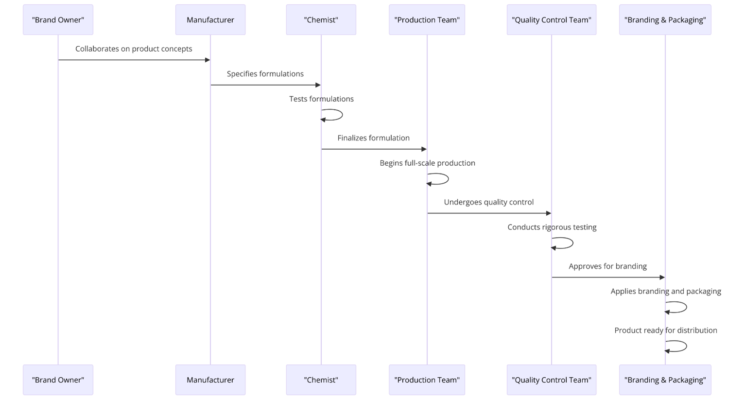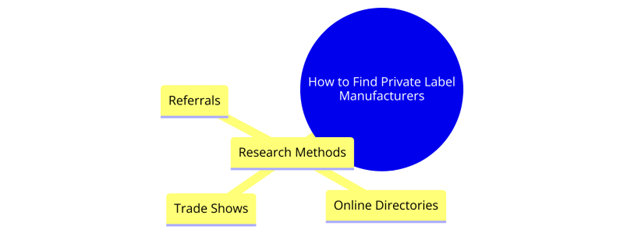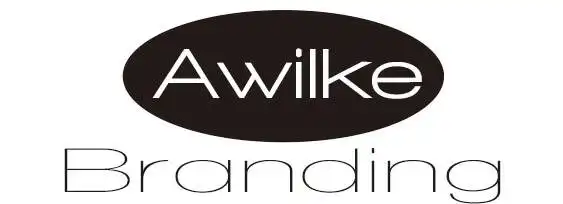
Understanding private label skincare manufacturing should be the first thing that will come to every entrepreneur’s mind. The skincare industry is booming, with a market value expected to reach $196.20 billion by 2030.
This surge is driven by a growing consumer demand for innovative, high-quality skincare products. Among the most significant trends is the rise of private label skincare, which offers entrepreneurs a lucrative opportunity to capitalize on this expanding market.
Private label skincare manufacturing allows businesses to create customized skincare lines without the hefty investment and complexity of starting from scratch.
For entrepreneurs, understanding the nuances of private label manufacturing is crucial to leveraging this trend effectively. From selecting the right formulations and packaging to navigating regulatory requirements and marketing strategies, there are several key elements to master. But let look at them in more details.
What Exactly is Private Label Manufacturing?
Private label manufacturing refers to the process where a manufacturer produces goods that are sold under the brand name of another company.
This approach allows businesses to offer unique products without investing in the extensive infrastructure needed for production.
In the skincare industry, private label manufacturing involves creating formulations, designing packaging, and ensuring regulatory compliance, all tailored to the specifications of the brand owner.
Understanding Private Label Skincare Manufacturing: How It Works

✔️ Concept Development:
The brand owner collaborates with the manufacturer to develop product concepts, including formulations, ingredients, and packaging design.
✔️ Formulation:
Chemists at the manufacturing facility create and test formulations based on the brand owner’s specifications.
✔️ Production:
Once the formulation is finalized, the product goes into full-scale production. This includes mixing, filling, and packaging.
✔️ Quality Control:
Rigorous testing ensures the product meets all safety and quality standards.
✔️ Branding and Packaging:
The final product is labeled with the brand owner’s logo and design, ready for distribution and sale.
Difference Between Private Label and Contract Manufacturing
| Aspect | Private Label Manufacturing | Contract Manufacturing |
|---|---|---|
| Ownership | Brand owner buys finished products from the manufacturer. | Brand owners hire a manufacturer to produce their formulation. |
| Control | Less control over formulation and production process. | More control over the entire production process. |
| Customization | Limited customization options; relies on manufacturer’s offerings. | Full customization based on brand owner’s specifications. |
| Examples | Many skincare brands like Sephora’s private label products. | Big brands like Estée Lauder often use contract manufacturers. |
Examples of Successful Private Label Skincare Brands
One notable example in the USA is Sephora’s private label skincare line, Sephora Collection. Sephora Collection offers a wide range of skincare products, from cleansers to moisturizers, that are well-regarded for their quality and affordability.
These products are developed in collaboration with manufacturers who specialize in creating high-quality skincare formulations, ensuring that the Sephora Collection maintains its reputation for excellence while meeting consumer demands for innovative and effective skincare solutions.
The Process of Collaborating with a Private Label Manufacturer
Understanding the process of collaborating with a private label manufacturer is crucial to ensuring a seamless and successful partnership. The table below provides a detailed breakdown of the process.
Step-by-Step Guide
| Stage | Actions | Details |
|---|---|---|
| Consultation | Define brand vision, target market, product ideas | Initial meeting to align on goals, budget, and timelines |
| Product Development | Create custom formulations, receive and test samples | Work with R&D team, provide feedback on samples |
| Regulatory Compliance | Ensure products meet all regulatory standards | Navigate FDA, EU, or other relevant regulations |
| Branding and Design | Develop packaging design, ensure labeling compliance | Choose containers, design labels, include necessary information |
| Agreement | Negotiate and sign contract, agree on production schedule | Define scope of work, pricing, timelines, confidentiality |
| Production and QC | Begin large-scale production, implement quality control measures | Ensure each batch meets high standards of quality and consistency |
| Packaging & Fulfillment | Package products according to specifications, coordinate shipping and distribution | Direct-to-consumer fulfillment or retail distribution |
| Launch & Marketing | Develop marketing strategy, maintain post-launch support | Social media campaigns, influencer partnerships, promotional events, restocking, product updates, troubleshooting |
How to Find Private Label Manufacturers
Finding the proper private label manufacturer is crucial in launching your skincare brand. This process requires thorough research and careful consideration to ensure that you partner with a manufacturer that aligns with your brand’s vision and quality standards.
Here are detailed methods to find reputable private label manufacturers.

Research Methods
1. Online directories:
Online directories are a practical resource for identifying potential private label manufacturers. These platforms provide a thorough list of manufacturers with reviews, ratings, and detailed information about their services.
✔️ ThomasNet:
A leading online platform that connects industrial buyers and suppliers in North America. It provides detailed profiles and reviews of manufacturers, making it easier to find a suitable partner.
✔️ Alibaba:
Alibaba is a multinational marketplace that connects buyers with manufacturers from around the world. It offers a vast selection of private label manufacturers with product catalogs and customer reviews.
✔️ Global Sources:
This directory connects international buyers with reliable suppliers from Asia, offering a wide range of products and detailed supplier information.
Advantages:
- Access to a wide range of manufacturers.
- Detailed information and customer reviews.
- Easy comparison of different manufacturers.
2. Trade Shows:
Trade shows are an excellent way to find private label manufacturers. They offer an opportunity to meet manufacturers face-to-face, see their products, and discuss your needs in person.
✔️ Cosmoprof:
One of the biggest beauty trade shows is in locations like Bologna, Las Vegas, and Hong Kong. It features exhibitors from all areas of the beauty industry, including private label skincare manufacturers.
✔️ In-Cosmetics:
A leading global event for personal care ingredients. It offers a platform for discovering new products and meeting suppliers, including private label manufacturers.
✔️ Private Label Manufacturers Association (PLMA) Trade Show:
An annual event that showcases private label products and manufacturers. It’s an ideal place to network and establish connections with potential manufacturing partners.
Advantages:
- Direct interaction with manufacturers.
- Opportunity to see and test products.
- Networking and establishing personal connections.
3. Referrals and Industry Connections:
Referrals from trusted industry contacts can lead to reliable private label manufacturers. Networking within the industry & seeking recommendations from peers can also provide valuable insights.
✔️ Industry Associations:
Joining industry associations like the Independent Cosmetic Manufacturers and Distributors (ICMAD) can provide access to a network of professionals and potential referrals.
✔️ Professional Networks:
Leveraging platforms like LinkedIn to connect with industry experts and ask for recommendations.
✔️ Existing Business Relationships:
Use your current business connections to get referrals for reputable manufacturers.
Advantages:
- Trusted recommendations from industry insiders.
- Insight into manufacturers’ reliability and quality.
- Potential for long-term partnerships based on trust.
Tips and Strategies for Selecting the Right Manufacturer for Your Personal Care Brand
Selecting the proper private label manufacturer is a pivotal decision for any skincare brand. The manufacturer you choose will significantly impact your products’ quality, consistency, and reputation.
Here are the key factors to consider when making this critical choice:

1. Quality Control:
Quality control is paramount in the skincare industry. Ensuring that every product meets high standards of quality and safety is essential to maintaining customer trust and brand reputation.
- Rigorous Testing: Verify that the manufacturer thoroughly tests raw materials and finished products to guarantee safety and efficacy.
- Consistency: Ensure the manufacturer has systems to maintain product consistency across different batches.
- Third-Party Audits: Check if the manufacturer undergoes regular third-party audits to verify their quality control processes.
2. Ingredient Sourcing and Quantity of Ingredients and Raw Materials:
The sourcing of ingredients and the quantity of raw materials used are crucial for product quality and sustainability.
- Sustainable Sourcing: Ensure that the manufacturer sources ingredients sustainably and ethically.
- High-Quality Ingredients: Look for manufacturers that use high-quality, natural, or organic ingredients.
- Transparency: The manufacturer should provide clear information about the origin & quality of their raw materials.
3. Certification Standards:
Certifications ensure that the manufacturer adheres to industry standards & regulations.
- GMP Certification: Good Manufacturing Practices (GMP) certification ensures that products are consistently produced & controlled according to quality standards.
- ISO Certification: International Organization for Standardization (ISO) certification indicates adherence to international standards for quality management.
- Organic and Natural Certifications: To market organic or natural products, ensure the manufacturer has relevant certifications from recognized bodies.
4. Communication and Support:
Effective communication and support from your manufacturer are essential for a successful partnership.
- Responsive Communication: Choose a responsive and communicative manufacturer that provides timely updates and promptly addresses concerns.
- Dedicated Support Team: A trustworthy support team can help navigate any issues during production and ensure a smooth process.
- Collaborative Approach: Look for manufacturers willing to collaborate and provide expert advice on product development.
5. Packaging Type and Customization Options:
The type and customization of packaging play a significant role in brand differentiation and customer appeal.
- Variety of Packaging Options: Ensure the manufacturer offers a range of packaging types, from bottles and jars to tubes and sachets.
- Customization: Look for customization options to design packaging that reflects your brand identity.
- Sustainable Packaging: Consider manufacturers that offer eco-friendly packaging options to align with consumer demand for sustainable products.
6. Pricing and Lead Times:
Understanding the pricing and lead times is crucial for planning and budgeting.
- Transparent Pricing: Ensure the manufacturer provides clear and transparent pricing, including any additional costs for customization or certifications.
- Competitive Rates: Compare pricing with other manufacturers to ensure you get competitive paces without compromising quality.
- Realistic Lead Times: Confirm the lead times for production & delivery to ensure they align with your product launch timelines and inventory management needs.
7. Experience and Expertise:
The experience and expertise of the manufacturer can significantly influence the quality & success of your products.
- Industry Experience: Choose a manufacturer with extensive experience in the skincare industry and a proven track record of success.
- Technical Expertise: Ensure the manufacturer has the expertise to develop and produce high-quality skincare products.
- Client Testimonials & Case Studies: Look for testimonials & case studies from other clients to gauge the manufacturer’s reliability and capability.
Challenges Involved in Private Label Business
Entering the private label skincare industry can be incredibly rewarding, yet it has its fair share of challenges. Entrepreneurs must navigate these obstacles to create a successful and sustainable brand.
The table below represents the common challenges faced in private-label skincare manufacturing and provides strategies to overcome them.
Challenges and Strategies:
| Challenge | Description | Strategy |
|---|---|---|
| Poor Communication | Misunderstandings, delays, subpar products | Regular updates, clear contracts, open communication channels |
| Quality Control | Inconsistent quality, non-compliance with standards | Third-party audits, consistent testing, feedback loop |
| Pricing | High manufacturing costs, hidden costs | Transparent costing, bulk orders, cost-effective ingredients |
| Marketing | Difficulty in brand differentiation, building consumer trust | Strong USP, digital marketing, customer reviews |
| Low-Quality Products | Subpar ingredients, poor formulation | Supplier vetting, R&D investment, regulatory compliance |
Benefits of Private Label Skincare Manufacturing
Here’s how these benefits contribute to the success of a private label skincare business.
1. Customization and Control Over Product Formulation and Packaging
One of the standout benefits of private label skincare manufacturing is its unparalleled customization and control. Unlike off-the-shelf products, private label manufacturing allows brand owners to tailor every aspect of their skincare products, from formulation to packaging.
This means you can create products that perfectly align with your brand’s vision and meet the specific needs of your target audience.
Imagine having the ability to choose high-quality, natural ingredients for your anti-aging serum, ensuring it caters to the growing request for clean beauty products.
You can also select innovative packaging that protects the product and enhances its appeal on the shelves.
2. Cost-Effective and Efficient Production
Private label skincare manufacturing also offers cost-effective and efficient production. Working with an established manufacturer means leveraging their expertise, infrastructure, and economies of scale.
This can seriously reduce the cost of production, allowing you to offer high-quality products at competitive prices.
For example, manufacturers often have established relationships with raw material suppliers, which can result in lower ingredient costs.
Additionally, their streamlined production processes can lead to faster turnaround times, ensuring your products reach the market quickly.
3. Flexibility and Scalability
Flexibility and scalability are crucial advantages of private label skincare manufacturing. As your brand grows, your manufacturing needs will evolve, and private label manufacturers can adapt to these changes seamlessly.
Whether starting with a small batch to test the market or scaling up to meet increasing demand, private label manufacturers provide the flexibility to adjust production volumes without compromising on quality.
4. Ability to Create Unique and Differentiated Products
In a saturated market, the ability to create unique and differentiated products is a game-changer. Private label manufacturing empowers you to innovate and develop products that stand out.
This uniqueness is not just about the ingredients or formulations but also about the story your brand tells and the experience it offers to consumers.
For instance, focusing on niche markets like vegan skincare or products tailored for sensitive skin can help you carve out a distinct identity in the market.
A private label manufacturer can help you develop these specialized products, ensuring they meet the highest quality and efficacy standards.
What Entrepreneurs Need to Know to Start Their Personal Care Brand
Launching a personal care brand is a dream for many entrepreneurs, driven by a passion for skincare and the desire to offer unique products to consumers.
However, transforming this dream into a successful business requires careful planning, deep understanding, and strategic execution.
Here’s a comprehensive guide on what you need to know to start your personal care brand.
Research and Development:
Research and Development (R&D) is the cornerstone of creating compelling and innovative personal care products.
Understanding skin types, the properties of various ingredients, and current product trends is essential for developing formulations that meet consumer needs.
✔️ Skin Types: Recognize the different skin types—oily, dry, combination, sensitive, and routine. Each type has unique needs & responds differently to various ingredients.
For example, hyaluronic acid is excellent for dry skin due to its hydrating properties. In contrast, salicylic acid is beneficial for oily skin prone to acne.
✔️ Ingredients: Stay informed about beneficial ingredients such as antioxidants, vitamins, and plant extracts. Understanding their benefits and potential side effects helps formulate safe and effective products.
For instance, vitamin C is well-known for its brightening properties, while tea tree oil is famous for its antibacterial effects.
✔️ Product Trends: Stay abreast of emerging trends in the skincare industry. Consumers are gravitating towards natural and organic products, as well as those offering multifunctional benefits like anti-aging and sun protection.
Regulations and Compliance:
Steering the complex landscape of regulations and compliance is crucial for the success and legality of your personal care brand. Understanding and adhering to guidelines ensures your products are safe and trustworthy.
✔️ FDA Guidelines: The FDA regulates personal care products in the United States. Ensure that your products comply with FDA guidelines, which include requirements for safety, labeling, and manufacturing practices. This includes registering your products and facilities with the FDA.
✔️ Labeling Requirements: Accurate and clear labeling is essential. Labels must include ingredients, usage instructions, warnings, and the manufacturer’s information. Mislabeling can lead to regulatory issues and loss of consumer trust.
✔️ Safety Standards: Conduct thorough testing to ensure your products are safe for consumer use. This involves stability, microbiological, and patch testing to check for allergic reactions.
Marketing and Branding:
Marketing and branding are critical to distinguishing your personal care brand in a crowded market. A unique brand identity & effective marketing strategy can attract and retain loyal customers.
✔️ Brand Identity: Develop a persuasive brand identity that resonates with your target audience. This includes your brand name, logo, color scheme, and overall aesthetic.
For example, if your brand focuses on eco-friendly products, ensure your branding reflects sustainability and natural beauty.
✔️ Marketing Strategy: Prepare an extensive marketing strategy that includes digital marketing, social media, influencer collaborations, and content marketing.
Use platforms like Instagram, YouTube, and TikTok to reach your audience, showcase your products, and share educational content.
✔️ Unique Selling Proposition (USP): Identify and highlight your brand’s USP. Whether it’s using organic ingredients, cruelty-free testing, or innovative formulations, make sure it’s clear to your customers why your brand stands out.
Best Recommendation
One of the most significant hurdles entrepreneur’s faces is finding a reliable and professional partner who can bring their concept to life without compromising on quality or efficiency.
Imagine the frustration of dealing with inconsistent product quality, delayed timelines, and unclear communication from your manufacturer.
These issues hamper your brand’s reputation and erode customer trust and loyalty. To avoid these surprises, it’s crucial to partner with a manufacturer who understands your vision, shares your commitment to superiority, and has a proven track record of delivering top-notch products.
This is where AWilke Branding stands out. As a leading private-label skincare manufacturer, AWilke Branding offers unparalleled expertise, state-of-the-art facilities, and in-depth experience with market trends and regulatory requirements.
With AWilke Branding, you gain access to a team of professionals dedicated to ensuring your products meet the highest quality and safety standards.
Our comprehensive services include everything from formulation development and ingredient sourcing to packaging design and regulatory compliance, making them the perfect partner for entrepreneurs looking to create a standout personal care brand.
Don’t let the complexities of starting a personal care brand overwhelm you. Partner with Awilke Branding by clicking the Contact Us button below.

 Top Organic Skincare Trends for 2025: Insights for Private Label Entreprene...
Top Organic Skincare Trends for 2025: Insights for Private Label Entreprene...


